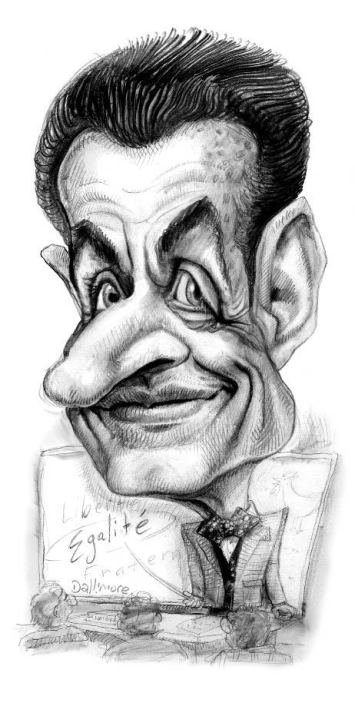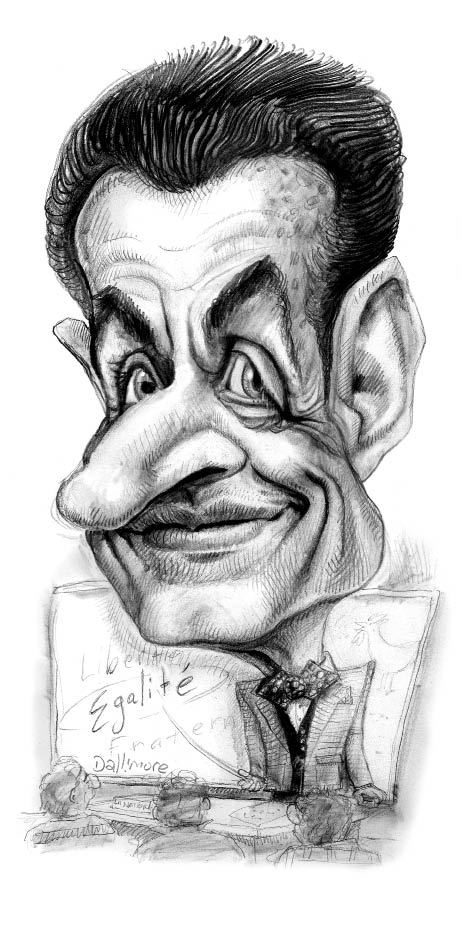The French president’s chances of re-election look bleak. But the problem is not his politics, says Patrick Marnham, so much as his embarrassing personal life
Gordon Brown is not the only European leader who is regarded as an electoral liability by his own party. With two years to go before France’s next presidential election Nicolas Sarkozy’s chances are not looking good. He is entitled to run for a second five-year term, but in 2012 it will be 24 years since the French chose a president from the left. Many voters think it is time for a change. Mr Sarkozy is now one of the most unpopular political personalities in France.
In last month’s regional elections the Union pour un Mouvement Populaire (UMP), Sarkozy’s party, lost 21 out of 22 regions to the Parti Socialiste. And within days the tractors were once again rolling into Paris, 1,000-strong, carrying mobs of angry farmers. Three years of frantic attempts to drag France into the economic 21st century seem to have got nowhere.
When he came to power Sarkozy promised ‘la rupture’ (a clean break). He was going to end unemployment, reduce the government’s huge public spending deficit, lower taxes, embrace the global economy and shrink the state. Today unemployment is at 10 per cent, which is the highest level for a decade, and this year the country’s state pension deficit will be a record E11 billion. The president is under pressure to increase taxes further, and the state remains unshrunk. France still has one of the highest levels of public spending in Europe. Public finances are not in as big a mess as the UK’s but Sarko has managed to make himself even less popular. Taking on the massed ranks of trade unionists, farmers, civil servants and government pensioners who are the historical beneficiaries of the French system was never going to be easy. But two out of three French voters have now lost confidence in their president.
Nicolas Sarkozy has always been a volatile character — hyperactive, intimidating, sometimes seen as ridiculous, powered by terrible bursts of rage. If Rochdale’s Mrs Duffy had been giving Nicolas Sarkozy a piece of her mind, instead of Prime Minister Brown, she would have been lucky to be called ‘a bigot’. Last year one young farmer was told by the President, ‘Casse-toi alors, pauvre con’ (‘Get stuffed, you little cretin’).
It was alleged when he was running for the presidency that Mr Sarkozy was mentally unstable, and his office was forced to deny that he had been seeing a psychiatrist. In fact, he does not seem to be psychologically fragile but he does not do emotional self-control, and his worst behaviour and most obvious misjudgments are often linked to some crisis in his private life. This became clear immediately after his election, when Sarkozy tried to keep his then wife Cécilia happy by giving her quasi-official status. She responded by ignoring official guests, walking out of two international conferences and snubbing President Bush in Washington. But her husband would not give up. In July 2007 Cécilia was flown to Libya to play a prominent part in a negotiation for the release of a Bulgarian medical team who were being held hostage by Colonel Gaddafi. The French government claimed at the time that Cécilia had personally persuaded Gaddafi to release the hostages. In fact, they had been ransomed and French diplomats had conducted all the negotiations. Three months later the Sarkozys were divorced and two weeks after that Gaddafi turned up in Paris on a state visit that turned out to be part of the price France had paid for the hostages. A senior presidential aide has since been quoted as saying of Sarkozy, ‘During his divorce he simply abandoned his presidential functions.’
In the following month Sarkozy began a far too public romance with the pop singer Carla Bruni. Photographs of the couple canoodling on the Nile earned him the nickname ‘President Ray-Bans’. When it comes to sex the French do not really mind what their politicians get up to, as long as it is not embarrassing. Sarkozy’s tempestuous relationship with Cécilia and slavish overexcitement about Carla were both considered embarrassing. As one of his supporters commented at the time: ‘I don’t care what he does with Carla Bruni as long as he stops doing it in the newspapers.’ Even the couple’s state visit to Britain was caricatured. A cartoonist in Le Monde showed a flunky announcing them at Buckingham Palace as ‘President Sarkozy of France and his Really Hot Wife’.
Sarkozy’s next gaffe was to arrange for his 22-year-old son Jean to stand as the UMP candidate for the chairmanship of the influential council that runs the Paris business district. When he was accused of nepotism by both left and right, Sarko was outraged and accused his critics of plotting against his family and trying to ‘destroy a young man’s career’.
Last autumn the former prime minister Dominique de Villepin was tried by the High Court in Paris, accused of conspiring to frame Sarkozy by forging his name on a list of foreign bank account holders. De Villepin was acquitted, though others involved in the matter were convicted. The trial was the culmination of a bitter vendetta between the two men and represented a fearsome act of revenge on Sarkozy’s part. But even before de Villepin’s trial opened Sarkozy managed to get himself charged with contempt of court. He had referred to the accused on television as ‘the guilty men’.
Recent speculation about the state of Sarkozy’s current marriage (both he and his wife were said to be having affairs) ended in April when Carla broadcast to the nation denying the rumours. But the embarrassment factor returned when she added, ‘I am speaking in my husband’s name.’ Sending your wife into a radio studio to tell people that you are happily married is simply not what the French expect from their president.
France’s highly effective prime minister, François Fillon, has defended the president, saying that his unpopularity is not due to his incompetence but is a consequence of the global financial crisis (where have we heard that before?). But the popularity slump started in September 2007, before the crisis hit France, when in the course of six months Sarkozy lost 23 points in the polls. This was the period covering the release of the hostages, the divorce, Gaddafi’s visit, high jinks with Carla, and his remarriage. It was not the world crisis that did for his popularity. It was his perceived inability to separate public duty from private life.
Following last month’s calamitous election results, the right has already started to manoeuvre for the succession, on the assumption that their president will not be running in 2012. There is a feeling that ‘Sarko can no longer beat the left’. Two early candidates, Dominique de Villepin and Alain Juppé, are both former prime ministers who were loyal to Sarkozy’s predecessor, Jacques Chirac.
But it would be a mistake to assume that Sarkozy will quit merely because he is so unpopular. He was not elected because France loved him; he was elected to do a job which 53 per cent of the electorate thought was essential. How strange if the rottweiler of French politics were to be defeated not because he failed to dismantle the ruinous state machine but because he had turned into a character from one of his wife’s soupy pop songs.







Comments